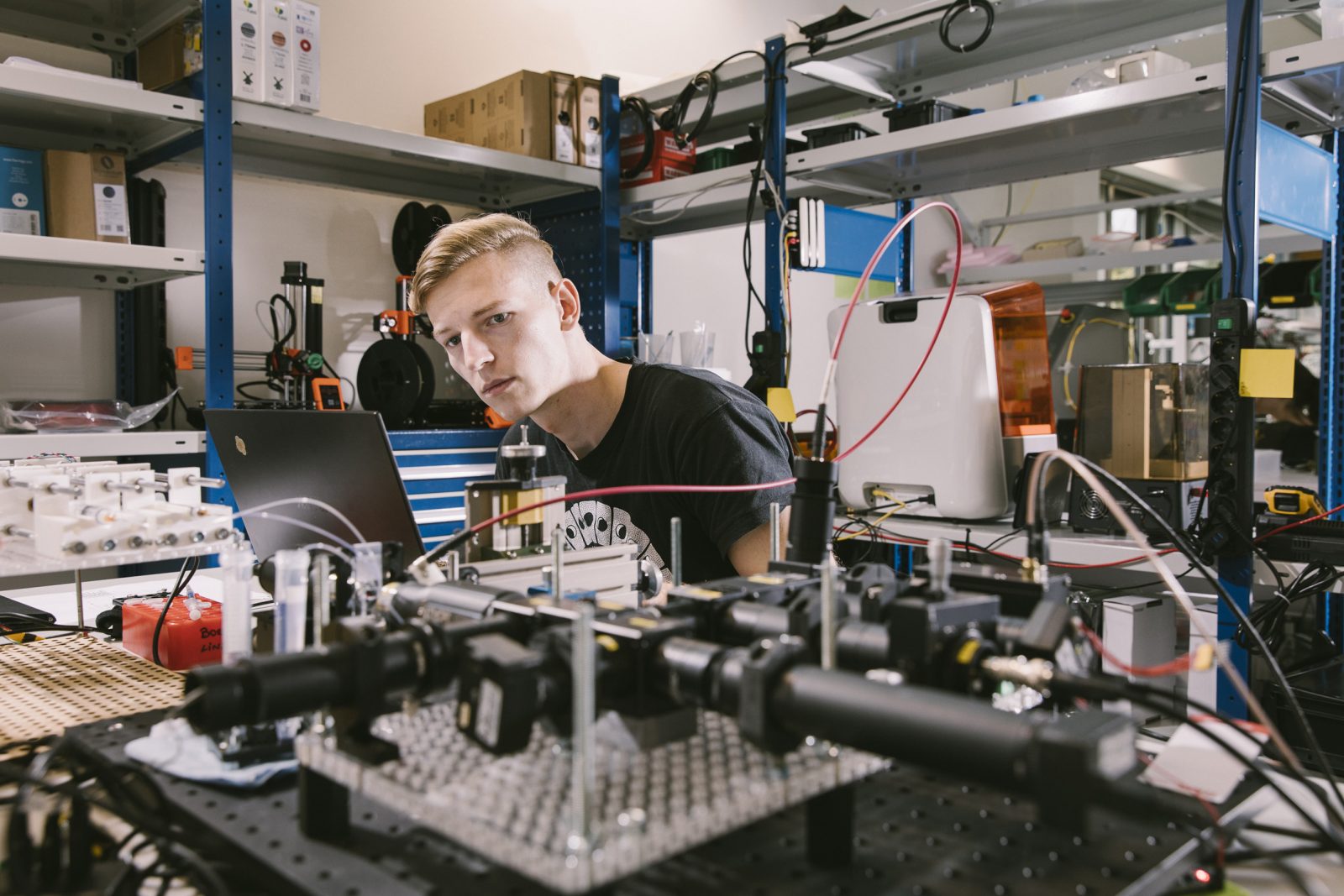We know that every breakthrough in life sciences is driven by passionate teams. Scaling a company isn’t just about funding and product development—it’s about building a strong, engaged team that can navigate growth, regulations, and innovation.
Through conversations with founders, HR leaders, and decision-makers, we explore the human side of scaling life sciences companies. How do you attract top talent, keep your startup spirit, and build a culture that drives both science and business forward? We help companies answer these questions every day, but this is about more than what we know—it’s about learning together and sharing real stories. Read our interview, with insight from Daniela Buchmayr.

Daniela Buchmayr is the CEO and co-founder of Sarcura, a startup revolutionizing cell therapy manufacturing. With a career spanning corporate leadership, medtech, and biotech, she brings a unique perspective on how leadership, culture, and team dynamics drive success in a startup environment. Sarcura operates at the intersection of biotech, medtech, and deep tech—challenging conventional industry structures and paving the way for more autonomous, scalable manufacturing solutions. Daniela shares her journey, leadership philosophy, and the lessons she’s learned along the way.
Daniela, your leadership journey spans corporate roles and now running a startup. What have been the biggest differences between leading in a corporate setting and leading a startup?
Transitioning from corporate to startup leadership required me to unlearn many things. In a corporate setting, you inherit structures, processes, and ways of working that are largely unquestioned. In a startup, everything is up for debate—nothing is set in stone, and you often find yourself operating in complete ambiguity.
One of the biggest shifts was realizing that people watch and interpret leadership much more intensely in a startup. In times of crisis, people look to you not just for answers but for emotional stability. And the reality is, as a founder, you don’t always have the answers. But I’ve learned that having a direction, even if it changes later, is better than showing hesitation.
How do you define and build high-performing teams in a startup environment?

A high-performing team isn’t just about skills or experience—it’s about how well people work together, how they challenge each other, and how they adapt. In a corporate environment, there’s often an inherent baseline of alignment that you don’t question. But in a startup, you bring together people from very different industries and backgrounds, and you have to consciously build that alignment.
We deliberately hired people from biotech, engineering, and academia, but we underestimated how different their ways of thinking were. Scientists, engineers, and businesspeople can use the same words but mean completely different things. It took time to create a culture where people felt safe enough to ask, “Why is that?” even if they weren’t an expert in that field. That openness to challenge each other is what makes a team truly high-performing.
“Scientists, engineers, and business people can use the same words but mean completely different things.”
We also emphasize the importance of building teams that are not only technically skilled but also highly adaptable. Interestingly, we’ve found that sometimes a generalist with less expertise—but who asks the right questions and challenges assumptions—can help the team advance faster than a group full of specialists who hesitate to challenge each other. This willingness to ask ‘why’ and connect the dots across disciplines fosters innovation and accelerates problem-solving.
Because our company operates at the intersection of multiple disciplines, we are constantly challenged to bring in multi-disciplinary candidates who can bridge gaps between fields like biotech, engineering, and data science. These individuals not only contribute technical knowledge but also play a key role in ensuring that different perspectives are integrated into our solutions.
What do you look for when hiring people for a startup like Sarcura?
Mindset is just as important as skillset. Startups require a specific type of person— someone who thrives in ambiguity and doesn’t need rigid processes to function.
One of the key aspects we focus on is a skills-based approach to hiring. Instead of relying solely on traditional qualifications, we assess what someone can do in practical scenarios. We look for individuals who can bridge different disciplines, communicate effectively, and contribute beyond their core expertise. The ability to translate knowledge into action is essential.
We’ve found that focusing on competencies and adaptability rather than job titles leads to stronger teams. It ensures that we are bringing in people who are not only capable in their fields but can also collaborate effectively in an evolving environment.
How have you evolved as a leader through this journey?

I’ve learned that communication is everything. In my corporate roles, I was good at bringing people together to make decisions, but I underestimated how much a founder needs to constantly reinforce vision and strategy. When you run a startup, you see the big picture every day, but your team doesn’t—they only see their part of it. I used to assume that one strategic meeting was enough to align everyone, but I quickly learned that I had to repeat, reinforce, and reframe the vision over and over again.
I also realized that people react much more strongly to leadership in startups than in large organizations. When you’re a CEO in a corporate setting, you’re part of a larger system. But in a startup, your energy, your decisions, and even your non-verbal cues have a huge impact. If you’re frustrated, the team will feel it. If you’re unsure, they’ll sense it. That level of scrutiny means you have to be very deliberate in how you show up every day.
Investors play a huge role in startup success. How do you see their influence on leadership and decision-making?
Investors don’t just look at technology; they look at the leadership team. Especially in earlystage startups, investors aren’t just betting on the idea; they’re betting on the founder’s ability to execute.
It surprised me how much investors focused on me as a person—how I handle challenges, how I make decisions, and how I communicate. In corporate roles, it’s about the collective strength of the leadership team, but in startups, the CEO carries a lot more weight in investor decisions.
Bringing on the right external C-Level hires also matters. At one point, I hired a C-level executive from a global company, and while it gave us credibility with the investors, I quickly realized that corporate experience alone doesn’t translate into startup success. Some people struggle to adjust, no matter how strong their background is. It’s not just about skills—it’s about whether they can thrive in uncertainty.
What’s your final piece of advice for other founders and startup leaders?
Be very conscious of who you bring into your startup—not just in terms of skill but in terms of mindset. You need people who embrace uncertainty, adapt quickly, and challenge assumptions. Also, adopt a skills-based hiring approach. Traditional credentials can be useful, but what really matters is whether someone can apply their expertise in a dynamic, real-world environment. And finally, learn fast and don’t be afraid to coursecorrect. A wrong decision is better than indecision. You can always pivot, but you can’t afford to stay stuck.
Interview by Annett Zippel
 Annett specializes in executive search and leadership advisory within the life sciences industry. She works with biotech, pharmaceutical, and healthcare companies to build strong leadership teams that drive innovation and growth. With a deep understanding of industry dynamics, she helps organizations navigate change, align talent with strategy, and foster high-performing teams. Passionate about connecting people and ideas, Annett is committed to shaping the future of life sciences through impactful leadership.
Annett specializes in executive search and leadership advisory within the life sciences industry. She works with biotech, pharmaceutical, and healthcare companies to build strong leadership teams that drive innovation and growth. With a deep understanding of industry dynamics, she helps organizations navigate change, align talent with strategy, and foster high-performing teams. Passionate about connecting people and ideas, Annett is committed to shaping the future of life sciences through impactful leadership.



